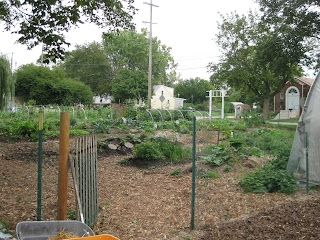This week I finally finished reading
Earth Abides, by George R. Stewart.
Reading this novel was a journey, to say the least. I see why it continues to rank amongst the greatest science fiction novels of all time. Published in 1949, this dystopian American tale is a must-read for everyone! Sean and I have a few "loaner" copies, but recommend that you find your own copy and hang on tight.
Earth Abides, by George R. Stewart.
Reading this novel was a journey, to say the least. I see why it continues to rank amongst the greatest science fiction novels of all time. Published in 1949, this dystopian American tale is a must-read for everyone! Sean and I have a few "loaner" copies, but recommend that you find your own copy and hang on tight.
"The irony of all things impressed him more and more. What you were preparing against - that never happened! All the best-laid plans could not prevent the disaster against which no plans had been laid." (Earth Abides, 280)
"If the Tribe needed a symbol of strength and unity, if they were happier with the hammer as a rallying point - who was he to enforce rationalism? Perhaps rationalism - like so much else - had only been one of the luxuries which men could afford under civilization." (Earth Abides, 284)
- - - - - - - - - - - - - - -
For months, I've been plucking my way through John Ralston Saul's Voltaire's Bastards: The Dictatorship of Reason in the West.
Published in 1992, this academic approach to the history of reason is a fascinating piece of cultural criticism. I'm taking my time with this enlightening (haha!) book. If I sped through it, my brain would melt into mush and drip out through my ears.
- - - - - - - - - - - - - - -
For months, I've been plucking my way through John Ralston Saul's Voltaire's Bastards: The Dictatorship of Reason in the West.
Published in 1992, this academic approach to the history of reason is a fascinating piece of cultural criticism. I'm taking my time with this enlightening (haha!) book. If I sped through it, my brain would melt into mush and drip out through my ears.
"The invention of the secret is perhaps the most damaging outgrowth of the power produced when control over knowledge was combined with the protective armour of specialization. Until recently very little was considered improper to know. Today the restricted lists are endless. And yet there can't be more than two or three real secrets in the entire world. Even the construction of an atomic bomb is now part of available knowledge. Nevertheless the imprisoning of information continues, undeterred by endless access-to-information legislation.
These restrictions have been counterbalanced over the last thirty years by an apparent explosion in individual freedoms. This breakdown of social order - rules of dress, sexual controls, speech patterns, family structures - has been seen as a great victory for the individual. On the other hand, it may simply be a reflection of the individual's frustration at being locked up inside a specialization. These acts of personal freedom are irrelevant to the exercise of power. So in lieu of taking a real party in the evolution of society, the individual struggles to appear as if no one has power over his personal evolution. Thus victories won for these individual liberties may actually be an acceptance of defeat by the individual."
(Voltaire's Bastards, John Ralston Saul, 29)
"We are constantly declaring new ages. The conversion of the original Age of Reason into the Enlightenment of the eighteenth century was only a first step. Had humanity turned a great corner in the process? Not according to most definitions of the Enlightenment; for example, as a 'conviction that reason could achieve all knowledge, supplant organized religion and ensure progress towards happiness and perfection.'
The rational machine continued from there, being redefined ad infinitum, notably by Kant, until at last Nietzsche theoretically rejected the concept itself. But Nietzsche's discovery that reason was subject to passion and to supermen came a full half century after the real superman had actually galloped onto the public stage and given a demonstration. Napoleon had ridden in on the back of reason, reorganized Europe in the name of reason and governed beneath the same principle. The subsequent effect was to bolster the rational approach, not to discourage it.
This tells us a great deal about our other obscuring obsession. We have great difficulty dealing with philosophy in the context of real events. These two categories seem to live on separate planets. For example, we are still convinced that violence is the product of fear and fear is the product of ignorance. And yet, since the beginning of the Age of Reason, there has been a parallel growth in both knowledge and violence, culminating in the slaughters of the twentieth century.
Does this mean that knowledge creates greater fear than does ignorance? Or that the rational system has distorted the value of knowledge? Or something else? One thing it does demonstrate is that the separation of philosophy from real events has encouraged the invention of mythological obscurantism. The constant launching of new philosophical ages is part of that invention."
(Voltaire's Bastards, John Ralston Saul, 40-1)






















